In 1949, Mao Zedong established the Peoples’ Republic of China, which was formally recognized by the freshly independent Myanmar government. Since then the two neighboring countries have maintained relations, and this year marks the 70th anniversary of diplomatic ties. China became a close ally of Myanmar, especially when the Southeast Asian country was under the military regime in the late 1990s. Since 2018, with planned special economic zones, cross border railway links between the two countries and other mega development projects, Myanmar has officially been involved in Chinese President Xi Jinping’s Belt and Road Initiative (BRI), shaping future relations between the neighboring nations. On the eve of Xi’s visit to Myanmar, here is a chronology of the two countries’ relations over the past 71 years.
2020
Jan 9: Chinese Foreign Ministry spokesperson Hua Chunying announces that Xi will visit Myanmar on Jan. 17-18 at the invitation of Myanmar President U Win Myint.
2019
Feb 18: The first meeting of the Myanmar Steering Committee for Implementation of the BRI is held in Naypyitaw. Committee chair Daw Aung San Suu Kyi says thorough scrutiny of the projects under Beijing’s BRI is needed to assess their likely short- and long-term impacts on the country and the public.
Feb 21-22: Union Minister for Planning and Finance U Soe Win attends the second joint committee meeting of CMEC and the 2nd China-Myanmar Economic Corridor (CMEC) Forum in Kunming. The 2nd CMEC forum discusses ways to promote collaboration in the agriculture, livestock breeding, forestry, mining and tourism sectors, and implementation of the Kyaukphyu Special Economic Zone (SEZ), railroad, New Yangon and other projects under the CMEC. Additionally, the two sides discuss investment opportunities in Myanmar and the involvement of Chinese banks in the CMEC.
March 14: U Kyaw Tin, Union minister for international cooperation, meets Hong Liang, Chinese ambassador to Myanmar, to discuss the promotion of bilateral relations, the 2nd BRI Summit and China’s involvement in the Rakhine issue amid international pressure on Myanmar.
March 19: Union Minister for Economic and Foreign Relations U Thaung Tun meets Deng Boqing, deputy administrator of the China International Development Cooperation Agency, to discuss aid for the Bagan Pagodas. They sign two MOUs (memorandums of understanding) related to the renovation of the pagodas.
April 1-4: U Aung Win Oo, Myanmar Police chief, meets Ren Jun Hao, Yunnan Police chief, in Kunming to discuss cooperation on border affairs and rule of law, human trafficking and drugs. He also visits Huawei’s headquarters in Shenzhen during the trip.
April 9: Senior General Min Aung Hlaing, commander-in-chief of Myanmar’s armed forces, meets Chinese President Xi. During the trip, the senior general promises he will help implement the BRI in order to make it a success in Myanmar.
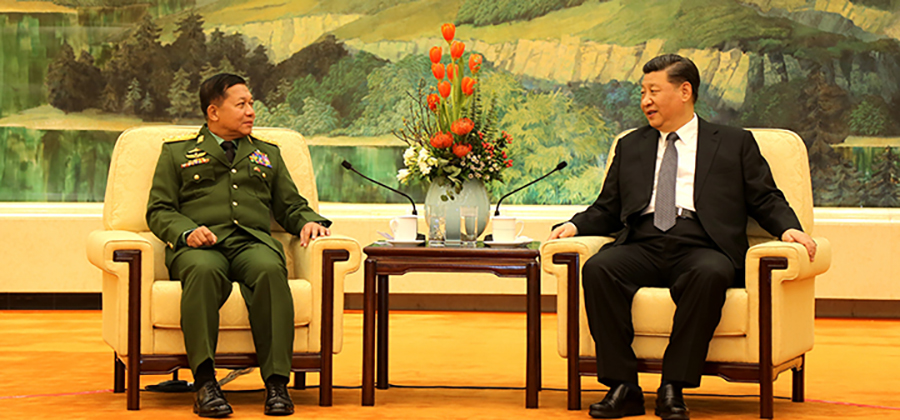
April 25-27: Myanmar State Counselor Daw Aung San Suu Kyi meets Chinese President Xi Jinping in Beijing while attending the 2nd Belt and Road Forum. The Myanmar government signs two MOUs and an agreement letter with China at the forum, detailing strengthened cooperation between the countries on the CMEC, trade and technology.
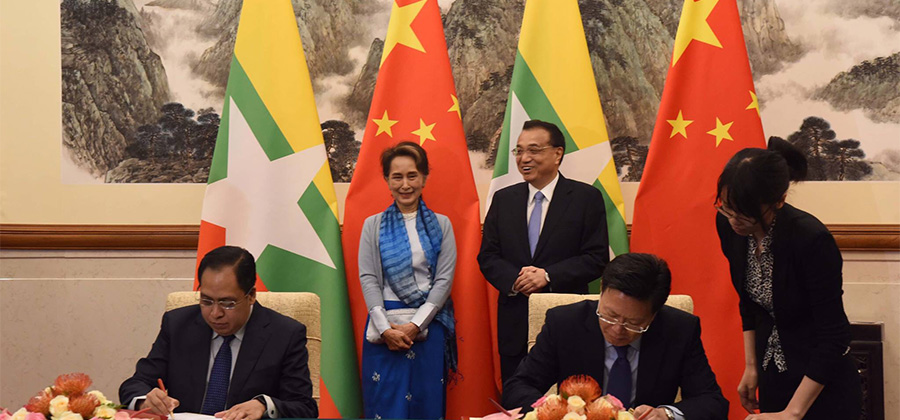
May 17: The opening ceremony of the China-Myanmar Economic Cooperation and Development Promotion Association and 1st CMEC Summit is held in Yangon.
May 17: The China Enterprises Chamber of Commerce in Myanmar (CECCM) opens its office in Naypyitaw.
May 20: The opening ceremony of the Myanmar-China Business Association (MCBA) is held in Naypyitaw. The association aims to promote BRI relations between the two countries.
May 29: U Phyo Min Thein, chief minister of Yangon Region, and Hong Liang, Chinese ambassador to Myanmar, visit the Daw Khin Kyi Hospital (First China-Myanmar Friendship Hospital), paid for by China, in Yangon.
June 18: President U Win Myint accepts the credentials of new Chinese Ambassador Chen Hai in Naypyitaw.
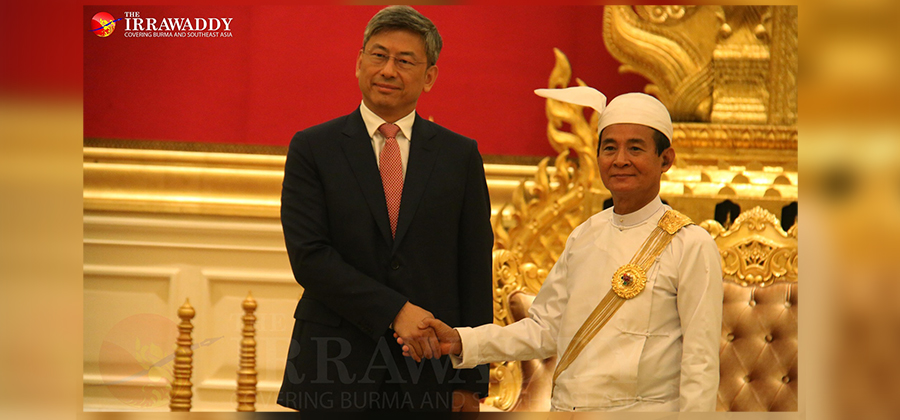
June 20: Senior General Min Aung Hlaing meets Ambassador Chen in Naypyitaw to discuss matters related to the implementation of the CMEC and the promotion of military cooperation.
June 21: A fourth Myanmar-China Friendship day is jointly organized by the Chinese Embassy and organizations of people of Chinese descent in Yangon.
July 3: Myanmar State Counselor Daw Aung San Suu Kyi meets Ambassador Chen to discuss the BRI, promotion of bilateral relations and the status of the peace process.
July 8: A total of 13 Myanmar academics, officials from the Information Ministry and five Chinese think tanks from Yunnan University hold a forum, “China-Myanmar Sustainable Development and Cooperation under the China-Myanmar Economic Corridor”, in Yangon.
July 12: The Yangon chief minister meets Ambassador Chen to promote relations and cooperation.
July 26: Chen visits the Kyaukphyu SEZ, deep-sea port, industrial zone, China-Myanmar pipeline and other Chinese projects in Kyaukphyu, Rakhine State.
Aug. 8: U Win Khaing, Union minister for electricity, meets Ambassador Chen to discuss cooperation on electricity and power for BRI projects.
Aug. 9: U Ohn Maung, Union minister for hotels and tourism, meets Ambassador Chen to promote Chinese tourism to Myanmar and cooperation on the BRI in the tourism sector.
Aug. 12: The China-Myanmar Friendship Film Festival is launched in Naypyitaw.
Aug. 14: Myanmar State Counselor Daw Aung San Suu Kyi meets Sun Guoxiang, Chinese special envoy for Rohingya repatriation and the peace process, in Naypyitaw.
Aug. 15: Yangon’s chief minister meets the Chinese ambassador to Myanmar to discuss the development of Yangon.
Aug. 19: China criticizes recent attacks by an alliance of ethnic armed groups on police and military outposts in northern Myanmar’s Shan State, saying the actions derail the country’s peace process and create instability in the region.
At a press conference in Beijing, Chinese Foreign Ministry spokesperson Geng Shuang says China “strongly condemned” the attacks carried out by three members of the Northern Alliance of ethnic armed groups—the Ta’ang National Liberation Army (TNLA), the Arakan Army (AA) and the Myanmar National Democratic Alliance Army (MNDAA).
Senior General Min Aung Hlaing meets Ambassador Chen to discuss the offensive.
Aug. 23: U Han Thar Myint, Dr. Myo Nyunt and U Than OO, members of the Central Executive Committee of the National League for Democracy, meet the Chinese ambassador in Yangon to promote party-to-party relations.
The Yangon Region chief minister, the Chinese ambassador and representatives of the Chinese business community in Yangon meet to discuss investment conditions in Yangon.
Aug. 23: U Than Htay, chair of the Union Solidarity and Development Party, meets Ambassador Chen in Yangon to promote party-to-party relations.
Sept. 2: At a press conference in Beijing, Chinese Foreign Ministry spokesperson Geng Shuang says China fully supports the recent meeting between Myanmar government representatives and Northern Alliance members. He said China hopes both sides will continue to engage in peace talks and take real action to ensure a ceasefire in northern Myanmar.
Sept. 16: Myanmar and China announce a plan to conduct the third joint inspection of their shared boundary next year, after 24 years of not being able to implement the activity.
Sept. 26: Myanmar Vice President U Myint Swe attends a reception to mark the 70th anniversary of the founding of the People’s Republic of China. At the reception, he praises bilateral relations with China and expresses optimism that they will continue to thrive and grow under President Xi’s ambitious grand infrastructure plan, the BRI.
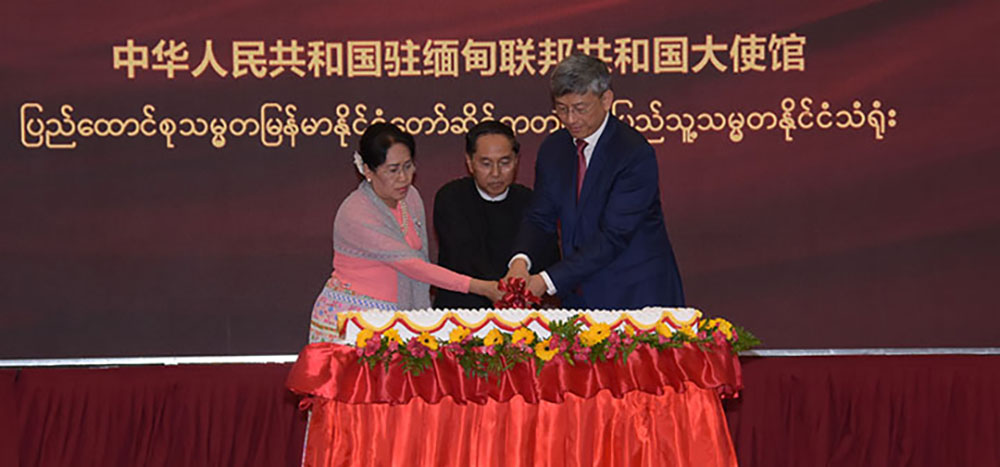
Nov. 4: A Myanmar state-owned enterprise inks a power purchase agreement with a Myanmar-China joint venture company that is developing a 135-megawatt (MW) power plant project in Kyaukphyu, in western Myanmar’s Rakhine State.
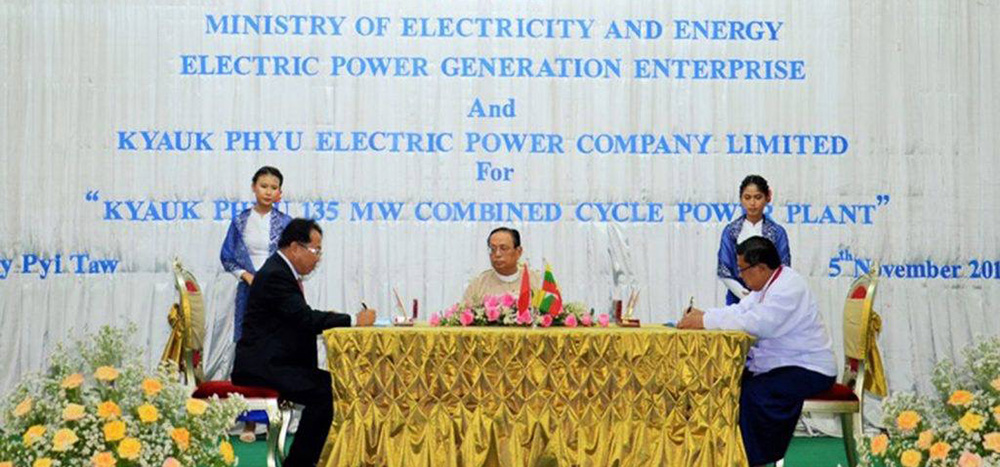
Dec. 7: Chinese Foreign Minister Wang Yi visits Naypyitaw and meets with State Counselor Daw Aung San Suu Kyi and Myanmar military chief Senior General Min Aung Hlaing. Wang pushes the Myanmar government to speed up construction of projects within the CMEC, which is a part of the giant BRI.
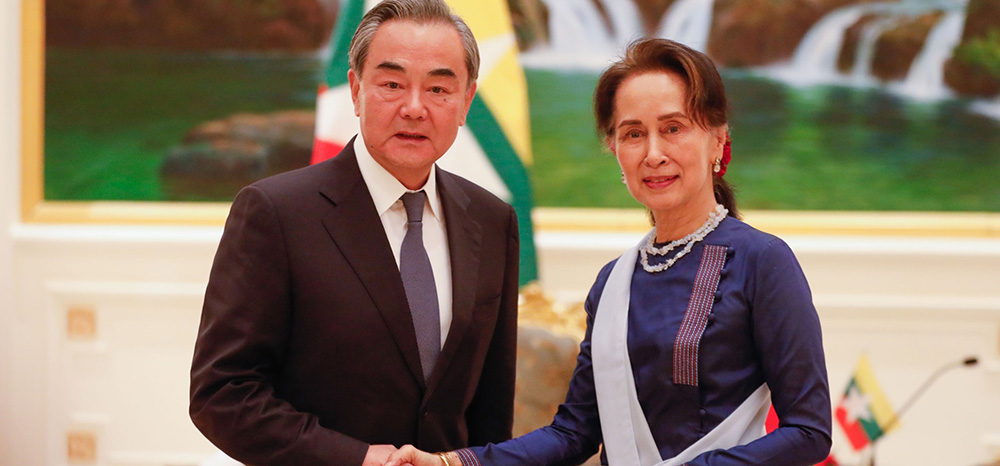
2018
Jan. 18: The State Counselor meets Chinese Vice Foreign Minister and Deputy Chief of Staff Major General Kong Xuan You. Their conversation focuses on the promotion of bilateral relations and cooperation, peace, stability and rule of law along the countries’ border.
The Third Myanmar-China (2+2) High Level Consultations led by the ministries of Foreign Affairs and Defense is held at the Ministry of Foreign Affairs in Naypyitaw. The Myanmar delegation is led by Union Minister for International Cooperation U Kyaw Tin and Lt-Gen. Tun Tun Naung, of the Office of the Commander-in-Chief (Army). The Chinese delegation is led by Kong Xuanyou, vice minister of foreign affairs, and Maj-Gen. Shao Yuanming, deputy chief of staff, Joint Staff Department of the Central Military Commission.
Commander-in-Chief of Defense Services Senior General Min Aung Hlaing receives a delegation led by Chinese Vice Minister of Foreign Affairs Kong Xuanyou in Naypyitaw.
Feb 14: The State Counselor meets Sun Guoxiang, special envoy for Asian affairs of China’s Ministry of Foreign Affairs. They discuss the future plans for Myanmar’s national reconciliation and peace efforts, and China’s plan for continued support to Myanmar.
March 10: The State Counselor receives delegations led by Li Fanrong, vice administrator of China’s National Energy Administration, to enhance cooperation in the areas of electricity and energy between Myanmar, China and Bangladesh.
April 25: The State Counselor receives Song Tao, minister of the International Department of the Communist Party of China. However, state media do not disclose details of the meeting. The State Counselor hosts a dinner for the visiting minister at her residence.
April 26: President U Win Myint meets Song Tao in Naypyitaw. They discuss matters related to national reconciliation, internal peace, bilateral friendship and cooperation, bilateral visits by the country’s leaders, the BRI, and peace and stability in Rakhine State.
April 26: Senior General Min Aung Hlaing receives Song Tao to discuss bilateral relations and the military’s efforts to advance the peace process in Myanmar.
Dr. Zaw Myint Maung, vice president (2), and other CEC members from the NLD meet Song Tao for closed-door discussions.
May 10: President U Win Myint receives Chinese Public Security Minister Zhao Kezhi to discuss border security, ways to tackle drug abuse, anti-human trafficking efforts, China’s assistance in providing the necessary police equipment to implement the rule of law and security, establishing a police control headquarters and implementation of the CMEC and Kyaukphyu SEZ.
State Counselor Daw Aung San Suu Kyi meets Zhao Kezhi to promote bilateral relations and provide assistance for peace efforts, enforcement of the rule of law and security issues in Myanmar.
Senior General Min Aung Hlaing meets Zhao Kezhi in Naypyitaw to discuss matters related to peace in border areas, cooperation on bilateral security and defense ties, and China’s stand on finding a solution for the Rakhine crisis.
May 20: Yangon Chief Minister U Phyo Min Thein meets Vice Chairman of the Chinese People’s Political Consultative Conference Wang Zhengwei to discuss the development of investment and economic conditions, new Yangon projects and industrial zone projects.
May 22: President U Win Myint meets Wang Zhengwei in Naypyitaw. According to a statement, they openly exchange views on bilateral cooperation on the BRI, the promotion of bilateral cooperation in economic sectors and the Rakhine crisis.
May 23: Myanmar State Counselor Daw Aung San Suu Kyi receives Wang Zhengwei to discuss Chinese cooperation on the peace process and the Rakhine situation.
Daw Aung San Suu Kyi receives Chinese Special Envoy Sun Guoxiang to discuss progress on the peace process and the Rakhine situation.
Senior General Min Aung Hlaing meets Special Envoy Sun to discuss China’s strong condemnation of the attacks by the Northern Alliance against security posts in Muse in northern Shan State.
June 6: Union Commerce Minister U Than Myint meets Shang Fulin, chairman of the 13th Subcommittee for Economic Affairs and a member of the 13th Standing Committee of the Communist Party of China to discuss the promotion of bilateral trade, investment, economic cooperation and infrastructure projects—particularly implementation of the Kyaukphyu SEZ and cooperation zones along the two countries’ border.
June 16: State Counselor Daw Aung San Suu Kyi receives Chinese State Councilor and Defense Minister General Wei Fenghe to discuss cooperation on security affairs, the peace process and the Rakhine issue.
Sen-Gen Min Aung Hlaing receives Gen. Wei Fenghe to discuss peace in border areas, strategic cooperation between the two armed forces and China’s stand on the Rakhine issue.
June 19-21: Union Minister U Thant Sin Maung attends the World Transport Convention 2018 and Belt and Road International Transport Symposia (BRITS) in Beijing. He delivers a speech titled “Belt and Road Initiative and Myanmar”.
June 27: Myanmar’s Upper House Speaker Mahn Win Khaing Than visits Beijing to promote parliamentary relations. During the trip he visits the creation of a small town in Zhongguancun, a Huawei showroom and the Great Wall of China in Beijing.
June 28: At the invitation of State Councilor and Foreign Minister Wang Yi, Union Minister for the Office of the State Counselor U Kyaw Tint Swe visits Beijing for a working visit. The two sides discuss issues of mutual interest including bilateral relations and cooperation in the international arena.
July 8: Union Minister for Home Affairs Lt-Gen Kyaw Swe attends the sixth ministerial meeting on law enforcement and security cooperation in Beijing. During the meeting, matters relating to combating terrorism, and the production and transport of drugs and precursors are discussed. Human trafficking, gambling and cyber-crime, controlling entry and exit along the border, and information exchanges between the two countries are also reviewed.
July 11: State Counselor Daw Aung San Suu Kyi receives Chinese Politburo member Huang Kunming to discuss the promotion of bilateral relations, especially close cooperation in the cultural and information sectors between the two countries.
July 14: State Counselor Daw Aung San Suu Kyi meets Chinese Special Sun Guoxiang to discuss matters relating to peace and the reconciliation process in Myanmar, including the third session of the 21st-Century Panglong Union Peace Conference and Chinese assistance for Rakhine State.
Sen-Gen Min Aung Hlaing meets Special Envoy Sun Guoxiang to discuss restoring peace in Myanmar, border stability and the situation in Rakhine State.
Aug. 21: A Myanmar delegation led by Union Minister for Electricity and Energy U Win Khaing visits Beijing to hold discussions with CNPC International Co. Ltd. chairman and Petro China Co. vice chairman Wang Zhongcai and officials from Sino Pipeline International Co. Ltd., Petro China Gas Marketing Co. Ltd. and Chinnery Assets Limited. They discussed matters related to China-Myanmar bilateral cooperation in the oil and gas sector, and potential future areas of cooperation.
Sept. 9: An agreement on the China-Myanmar Economic Corridor is signed in Beijing by Myanmar Minister of Planning and Finance U Soe Win and He Lifeng, chairman of the National Development and Reform Commission (NDRC). The NDRC, China’s top economic planning agency, aims to construct basic infrastructure across key economic centers in Myanmar.
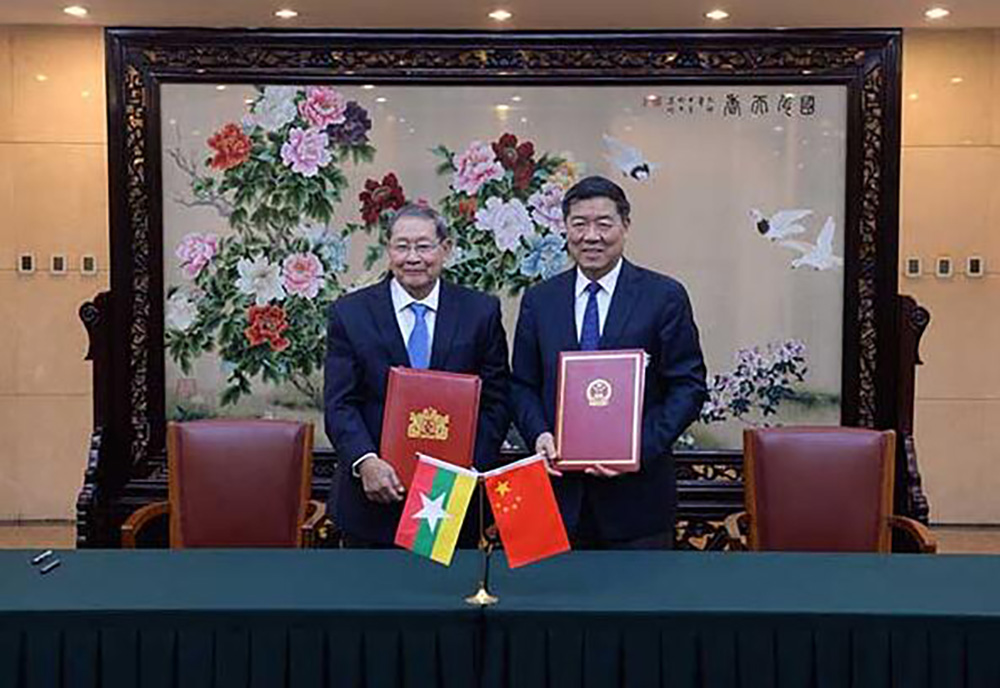
Sept. 11: Myanmar’s BRI steering committee is formed with State Counselor Daw Aung San Suu Kyi as chairperson to establish the China-Myanmar Economic Corridor. The committee comprises 25 members including 18 Union ministers (from ministries ranging from Home Affairs to Hotels and Tourism); five chief ministers (from Kachin, Mandalay, Rakhine, Yangon and Shan); the foreign affairs permanent secretary; and the chairman of the Naypyitaw Council.
Sept. 19: A delegation led by Mandalay Chief Minister Dr. Zaw Myint Maung and 18 NLD Central Committee members, including the chief minister of Magway Region, visits Beijing. The delegation meets high-level Chinese officials including Song Tao and Huang Kunming. The Communist Party of China arranges for the delegates to visit the Three Gorges hydroelectric dam, the world’s largest power station with an installed capacity of 22,500 MW, which spans the Yangtze River.
Oct. 18: Union Minister for Electricity and Energy U Win Khaing attends the Belt and Road Energy Ministerial Conference in Suzhou, China.
Oct. 22: Two state-owned companies—China Railway Eryuan Engineering Group (China Railway Group Ltd) (CREEG) and Myanmar Railways—sign an MOU to conduct a feasibility study as a part of the CMEC.
Nov. 7: The State Counselor receives Song Tao at her residence in Naypyitaw to discuss the peace process, Rakhine and the CMEC. The meeting is also attended by Mandalay Chief Minister Dr. Zaw Myint Maung and Peace Commission Chairman Dr. Tin Myo Win.
Union Minister for the Office of the State Counselor U Kyaw Tint Swe meets Song Tao to discuss the peace process, and border security and stability in Shan State.
Nov. 8: Sen-Gen Min Aung Hlaing meets Song Tao to discuss the promotion of friendly ties between the two countries, progress on Myanmar’s democratic transition, the Myanmar military’s involvement in the peace process, China’s involvement in the Rakhine issue and ways to strengthen ties between the two countries’ armed forces.
The Kyaukphyu SEZ Management Committee and the China International Trust and Investment Corporation (CITIC) ink a framework agreement for the development of the Kyaukphyu SEZ.
Nov. 9: China donates US$300,000 (about 440 million kyats) to the Union Peace Commission during a meeting between Dr. Tin Myo Win, chairman of the Union Peace Commission, and Special Envoy Sun Guoxiang.
Nov. 10: Myanmar State Counselor meets Sun Guoxiang to discuss developments in the peace and reconciliation process in Rakhine State.
Myanmar Vice President Henry Van Thio receives CITIC group chairman Chang Zhenming to promote bilateral cooperation and the implementation of the Kyaukphyu SEZ.
Nov. 27: Myanmar State Counselor Daw Aung San Suu Kyi meets Ning Jizhe, vice chairman of China’s National Development and Reform Commission. His visit aims to push the Myanmar government to work on practical cooperation to implement CMEC projects.
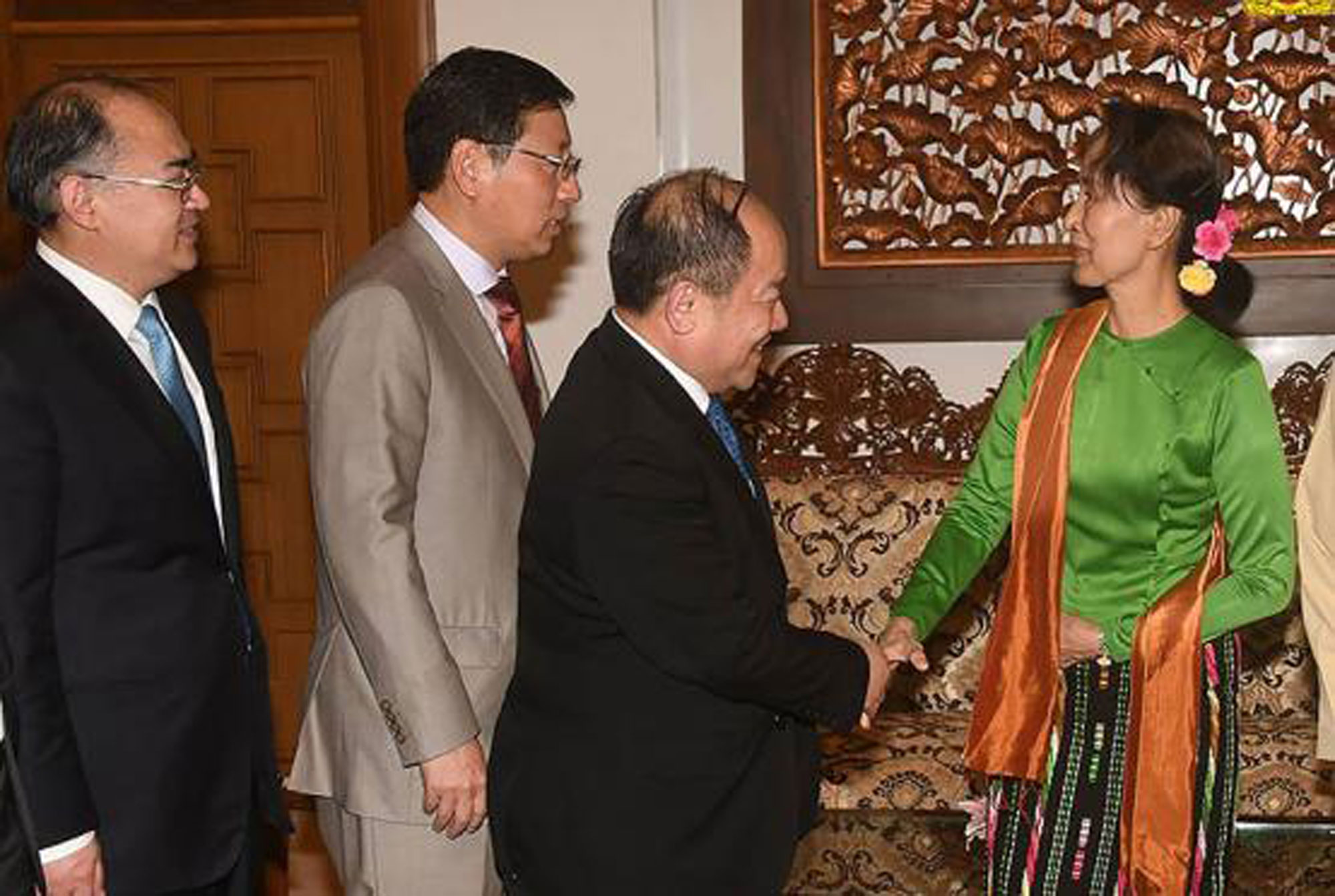
Dec. 4: Myanmar State Counselor Daw Aung San Suu Kyi meets Chen Hao, secretary of the Yunnan provincial party committee of the Communist Party of China, to discuss the promotion of trade, investment, peace and stability in border areas, and to reduce poverty alleviation and rural development in Myanmar.
Dec. 5: Sen-Gen Min Aung Hlaing meets Chen Hao to discuss promotion of relations with Yunnan Province and strengthen bilateral trade, border security and stability, and enhance exchange visits between the two militaries.
Dec. 20: The fourth round of Myanmar-China (2+2) high-level consultations are held in Kunming, Yunnan Province. The two sides exchange views in a friendly and cordial atmosphere on border-related issues focusing on China’s support for the peace process of Myanmar, promoting rule of law, peace and stability along Myanmar-China border, stabilization of the situation in northern Myanmar, confidence-building measures and development of border areas to promote the interests of the populations in those areas.
Dec. 28: Chinese Ambassador Hong meets with Kachin religious leaders and politicians in Myitkyina. During the trip, the ambassador strongly pushes them not to oppose the revival of the controversial Myitsone Dam project.
2017
Jan 28: The Yangon government organizes Chinese New Year Celebrations, said to be the grandest Chinese New Year celebrations in more than five decades. Yangon Region chief minister U Phyo Min Thein and National League for Democracy (NLD) Patron U Tin Oo both attend.
April 6-11: Myanmar ‘s President U Htin Kyaw makes his first goodwill visit to China and holds talks with Chinese President Xi Jinping and other Chinese leaders. The Kyaukphyu-Kunming oil pipeline agreement is signed.
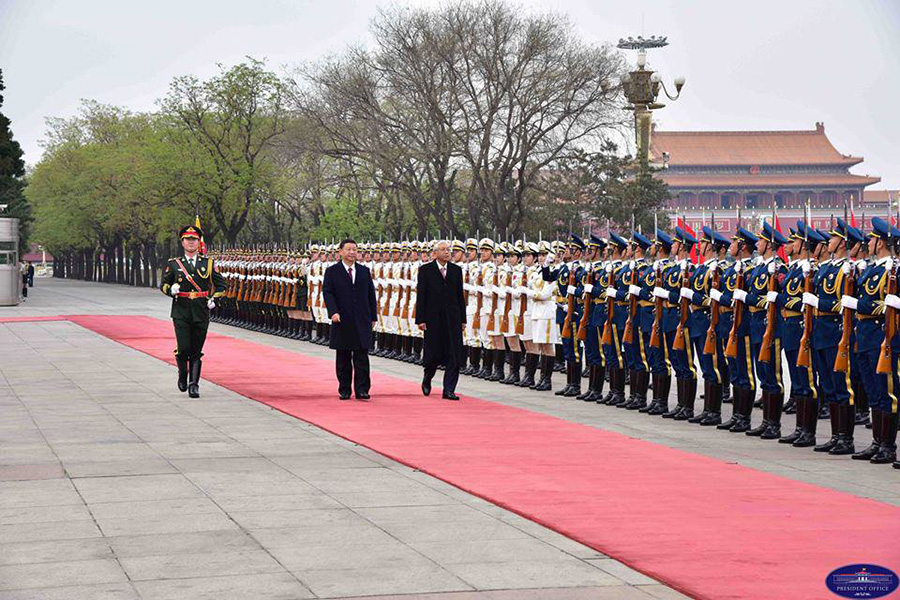
April 21: Myanmar’s State Counselor Daw Aung San Suu Kyi meets with Chang Zhenming, the chairman of the China International Trust and Investment Company (CITIC) Group in Naypyitaw to discuss the group’s involvement in the deep-water Seaport project in Kyaukphyu SEZ and transportation and infrastructure development in Myanmar. The meeting is joined by Myanmar cabinet members from the Ministry of Commerce, Foreign Affairs, Electricity and Energy along with Hong Liang, the Chinese Ambassador to Myanmar, and a CITC delegation.
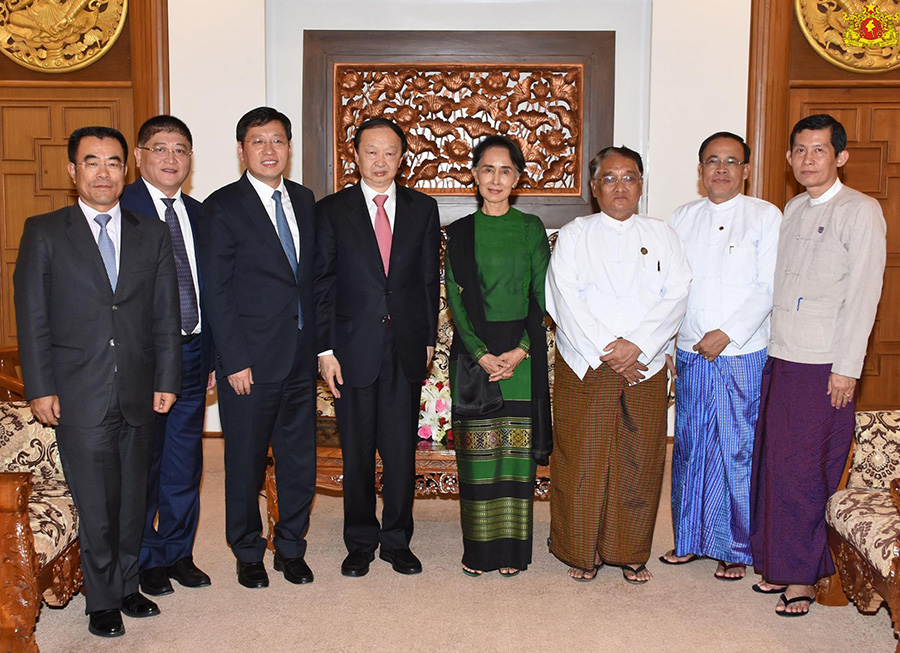
April 25: China offers to help tackle a diplomatic row between Bangladesh and Myanmar over the flight of Rohingya Muslims from Myanmar.
April 26: Top Chinese legislator Zhang Dejiang meets Chairman of the Legal Affairs and Special Cases Assessment Commission U Shwe Mann in Beijing. The two vow to push forward China-Myanmar ties. During the trip the chairman also has a meeting with the Chinese Deputy Foreign Minsiter Liu Zhenmin.
May 14-17: State Counselor Daw Aung San Suu Kyi attends the Belt and Road Forum for International Cooperation at the China National Convention Centre in Beijing, where she holds separate talks with Chinese President Xi Jingping and Premier Li Keqiang.
At the meetings, the leaders stress the importance of advancing “Comprehensive Cooperative Strategic Partnership Relations” based on the Five Principles of Peaceful Co-existence and existing “Pauk-Phaw” friendship, maintaining peace and stability and development of the border areas, continued support of China for the success of Myanmar’s reconciliation and peace process, promoting diverse cooperation between the two countries, particularly for the benefit of the two peoples through high-level communications and exchange of visits. Five Memoranda of Understanding are signed including an MoU on Cooperation within the Framework of the Silk Road Economic Belt and 21st Century Maritime Silk Road Initiative.
May 18: Two ships from the People’s Liberation Army Navy carrying over 550 military personnel pay a goodwill visit to Myanmar.
May 26: People’s Liberation Army presents locomotives and coaches to Myanmar Tatmadaw.
Jun. 1: State Counselor Daw Aung San Suu Kyi receives General Fang Fenghui, member of China’s Central Military Commission (CMC) and chief of the Joint Staff Department under the CMC, in Naypyitaw to discuss promotion of bilateral cooperation.
Aug. 4: State Counselor Daw Aung San Suu Kyi holds talks with Director of the International Department of the Central Committee of the Communist Party of China (CPC) Song Tao on cooperation between two countries.
Aug. 5: The groundbreaking ceremony of a China-funded renovation project of the Bahan Women’s Hospital, formerly named after Daw Khin Kyi, Myanmar State Counsellor Aung San Suu Kyi’s late mother, takes place in Yangon. The hospital whose renovation is scheduled to be completed by next September will become the first China-Myanmar Friendship Hospital.
Aug. 30: After a close-door meeting in New York, Britain requests a U.N. Security Council (UNSC) meeting on situation in Myanmar, but China resists stronger involvement by the U.N. in addressing the crisis.
Sep. 4: Sun Guoxiang, a special envoy of Asian affairs of the Ministry of Foreign Affairs of China, calls on Vice-President 1 U Myint Swe in Naypyitaw, with the former saying that the Chinese government condemns insurgent attacks in northern Rakhine State.
Sep. 5: Myanmar Army Chief Snr-Gen Min Aung Hlaing receives Special Envoy Sun in Naypyitaw. The Chinese envoy says the Chinese government completely has full confidence the Myanmar government and Tatmadaw will be able to solve Rakhine issue.
Sep. 8: The Chinese embassy formally opens its interim liaison office in the capital of Naypyitaw to further facilitate transactions between China and union-level agencies in Myanmar. The liaison office is the first foreign office permitted to open in Myanmar’s administrative capital.
Sep. 18: Chinese Foreign Minister Wang Yi tells U.N. Secretary-General António Guterres that China supports efforts by the Myanmar government to protect its national security and opposes recent violent attacks in Rakhine State.
Sep. 22: Chinese media travel to Rakhine to cover the situation there in the wake of militant attacks in Maungdaw.
Sep. 22: Gou Yezhou, deputy director of the International Department of the Central Committee of the Communist Party of China (CPC), in an interview with Reuters, speaks out against international intervention in Myanmar’s Rakhine issue.
Nov. 19: Chinese Foreign Minister Wang Yi holds separate talks with Myanmar President U Htin Kyaw, Daw Aung San Suu Kyi and Snr-Gen Min Aung Hlaing, focusing mainly on the peace process with the armed ethnic groups and the Rakhine issue.
Nov. 22-24: Snr-Gen Min Aung Hlaing pays a goodwill visit to China at the invitation of a member of the CMC and Chief of the Joint Staff Department of the PLA Gen. Li Zuocheng. During the visit, he meets Chinese President Xi Jinping and expresses thanks to China for its support of Myanmar over the Rakhine State issue. The Chinese president calls the army chief’s visit “successful.”
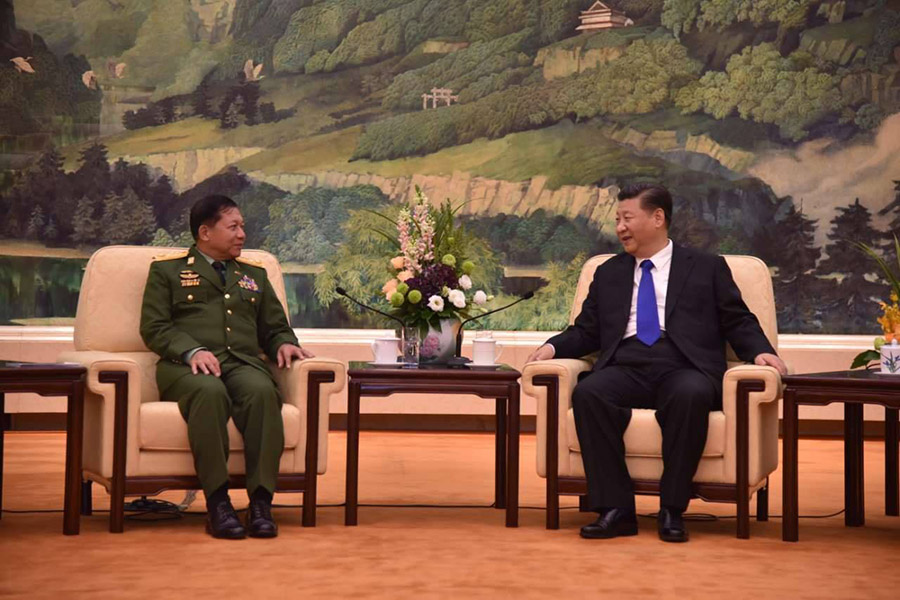
2016
April 5: Chinese Foreign Minister Wang Yi pays a goodwill visit to Myanmar at the invitation of Myanmar’s de facto leader Daw Aung San Suu Kyi. He is the first foreign minister to visit Myanmar since the government of the National League for Democracy (NLD) assumed office in March. The two discuss the strengthening of China-Myanmar ties and promoting the interests of citizens of the two countries.
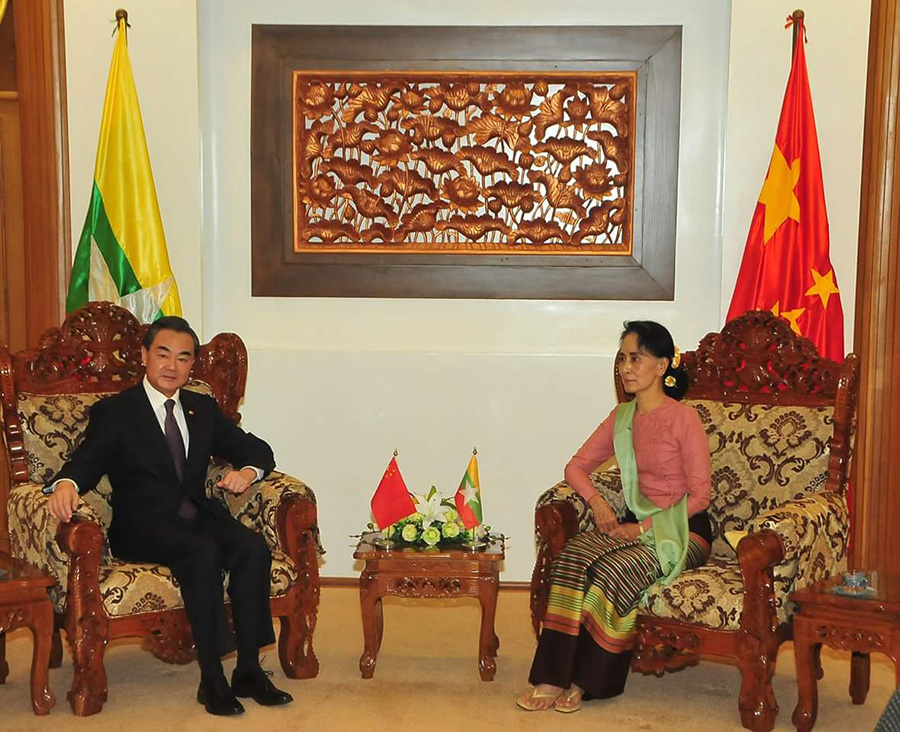
July, 26: China’s Special Envoy on Asian Affairs Sun Guoxiang addresses the summit of ethnic armed organizations in Kachin State’s Mai Ja Yang.
August 12: President U Htin Kyaw forms a 20-member commission to assess proposed hydropower projects on the Irrawaddy River. The commission is tasked with assessing the potential environmental and social effects of any proposed project along the Irrawaddy River, as well as the possible impact on foreign investment and the wider economy.
August 17-21: At the invitation of Chinese Premier Li Keqiang, Myanmar’s State Counselor Daw Aung San Suu Kyi visits China. In the trip, Myanmar and Chinese governments sign economic and technical cooperation agreement and Memorandum of Understanding (MoU) on a feasibility study for proposed Kunlong Bridge project which would be built with China’s assistance.
November 25: The first high-level meeting of foreign and defense ministries of Myanmar and China is held. Discussions focus on border stability and China’s role in Myanmar’s peace process.
2015
April 22: President U Thein Sein meets Chinese President Xi Jinping on the sidelines of the Asian-African Summit also known as the Bandung Conference in Indonesia’s Jakarta.
April 26: Myanmar’s Speaker of the Lower House meets vice chairman of the Chinese People’s Political Consultative Conference and director of the International Liaison Department of the Communist Party of China at Diaoyutai State Guesthouse in Beijing.
June 10-14: At the invitation of the Communist Party of China, Daw Aung San Suu Kyi visits China for the first time in her capacity as the chairwoman of the NLD and meets Chinese President Xi Jinping.
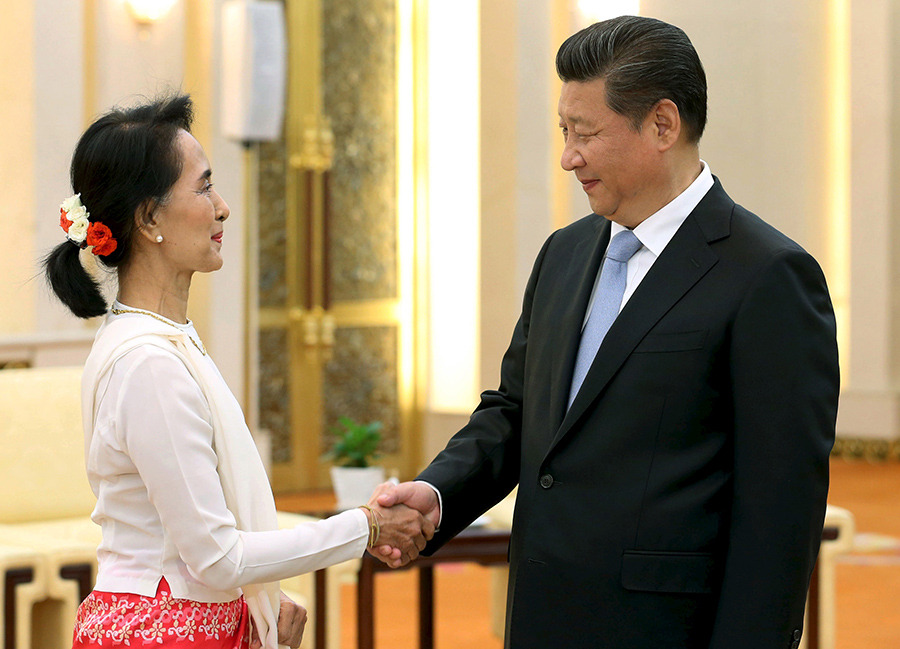
July 30: Over 150 Chinese citizens who were handed life sentences by a Myanmar court for illegal logging in Myanmar are released with presidential amnesty after they spent eight days behind the bars.
Oct 3: President U Thein Sein attends the 70th Anniversary of Victory of the World Anti-Fascist War at Tiananmen Square in Beijing.
Dec 4: Special Envoy of the Chinese Government and Vice Foreign Minister Liu Zhenmin pays a call on President U Thein Sein in Naypyitaw.
2014
Feb 19: Vice-President U Nyan Tun receives Chinese Ambassador to Myanmar Yang Houlan in Naypyitaw.
April 7: A parliamentary delegation led by Lower House Speaker Thura U Shwe Mann visits China and meets Chinese President Xi Jinping in Beijing.
May 19: Snr-Gen Min Aung Hlaing receives General Chang Wanquan, Minister of Defense and State Councilor of China in Naypyitaw. The Chinese general pays a call on President U Thein Sein the following day.
June 23: Chairman of the Union Election Commission U Tin Aye receives Chinese Ambassador to Myanmar Yang Houlan at the commission in Naypyitaw.
June 28-29: President U Thein Sein attends activities marking the 60th anniversary of the Five Principles of Peaceful Coexistence also known as Bandung Principles with Chinese President Xi Jinping, Premier Li Keqiang and Indian Vice-President Mohammad Hamid Ansari.
Nov 14: Chinese Premier Li Keqiang pays a state visit to Myanmar.
Dec 16: President U Thein Sein receives a Chinese goodwill delegation led by Chinese Vice-President Li Yuanchao in Naypyitaw.
Dec 22: Police Force and locals clash after China’s Wanbao Co fenced in the farmlands of farmers who have refused to take compensation for their confiscated farmlands in Letpadaung Copper Mine. Daw Khin Win, a 56-year-old local, is killed by a stray bullet in the clash.
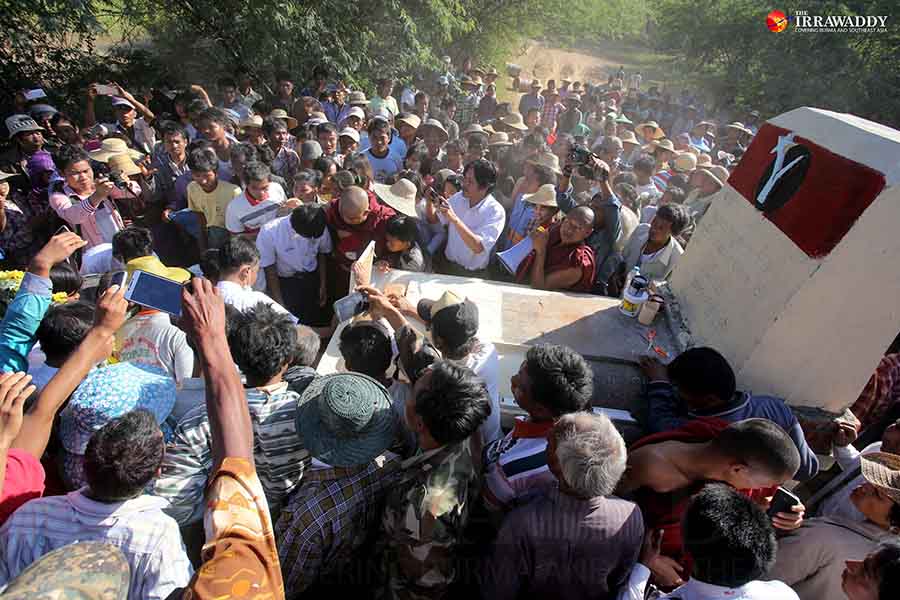
2013
Jan 1: Vice President Dr Sai Mauk Kham receives personnel of China Three Gorges Corporation (CTGC) and International Group of Entrepreneurs Company (IGOEC), which are implementing Mong Ton Hydropower Project.
Jan 15: A Chinese delegation led by deputy commerce minister Chen Jian meets NLD chairperson Daw Aung San Suu Kyi at the Parliament building in Naypyitaw and discusses investment between the two countries.
Jan 19: President U Thein Sein receives a Chinese special delegation led by deputy foreign minister Fu Ying at the Yangon Region government office.
April 5-7: President U Thein Sein meets Chinese President Xi Jinping in China. He gives an interview to journalist Li Xiaokun of the China Daily on April 6 and addresses the opening of Boao for the 2013 Asia Annual Conference.
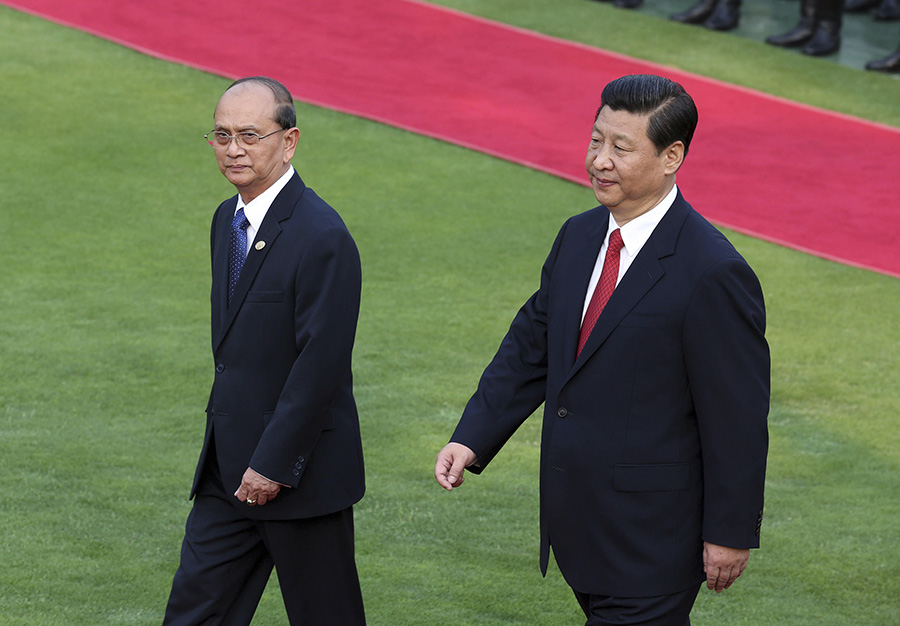
April 10: Myanmar Army Chief Snr-Gen Min Aung Hlaing receives Chinese Ambassador to Myanmar Yang Houlan.
June 23: State Councillor Yang Jiechi visits Myanmar.
July 23: President U Thein Sein receives Vice Chairman of Central Military Commission General Fan Changlong in Naypyitaw.
September 2: President U Thein Sein attends 10th China-Asean Expo in Nanning and meets Chinese Premier Li Keqiang.
October 16: Myanmar Army Chief Snr-Gen Min Aung Hlaing visits China and meets President Xi Jinping who is also the chairman of Central Military Commission of Communist Party of China.
2012
March 26: President U Thein Sein receives Governor of Yunnan Province Li Ji Heng in Naypyitaw.
July 10: President U Thein Sein receives State Councillor and Minister of Public Security of China Meng Jianzhu in Naypyitaw.
September 11: Vice-President Dr Sai Mauk Kham receives Chinese Ambassador to Myanmar Li Junhua.
September 22: President U Thein Sein attends the 9th China-Asean Expo in Nanning, capital of south China’s Guangxi Zhuang Autonomous Region.
2011
March 13: A Chinese delegation led by Lt-Gen Jia Tingan, deputy director of General Political Department of People’s Liberation of Army of China, calls on Myanmar Army Chief Snr-Gen Min Aung Hlaing and senior military officers in Naypyitaw.
April 4: President U Thein Sein receives Member of the Chinese Communist Party Central Committee Politburo and Chairman of the 11th National Committee of Chinese People’s Political Consultative Conference Jia Qinglin in Naypyitaw.
April 27: VicenPresident Thiha Thura Tin Aung Myint Oo attends the signing of a MoU between the Ministry of Transport and China Railways Engineering Corporation on the Muse-Kyaukphyu railroad project.
May 12: Myanmar Army Chief Snr-Gen Min Aung Hlaing receives Vice Chairman of the Central Military Commission General Xu Caihou in Naypyitaw and signs an agreement on cooperation between the two armed forces. President U Thein Sein also receives the Chinese general the next day.
May 27: President U Thein Sein makes his first state visit to China since assuming presidency in March where he meets Chinese President Hu Jintao, Premier Wan Jiabao and other leaders. The two countries promote their relationship on a strategic level, and nine economic agreements and memoranda of understanding are signed.
Oct 16: Vice President Thiha Thura Tin Aung Myint Oo receives chairman of the China Railway Engineering Corporation (CREC) in Naypyitaw and discuses cooperation in the railroad sector.
Oct 19: Vice President Thiha Thura Tin Aung Myint Oo holds talks with the chairman of the Industrial and Commercial Bank of China Yang Kaisheng on bilateral cooperation in the financial and banking sectors.
Nov 6: President U Thein Sein and his wife pay obeisance to the Tooth Relic of Buddha which is conveyed from China to Myanmar for a few days for public worship.
2010
Feb 25: The Ministry of Electric Power and two Chinese companies Hanergy Holding Group Limited and Goldwater Resources Limited (GRL) signed a Memorandum of Understanding on the implementation of Upper Thanlwin also known as the Kunlong Hydropower Project.
April 24: The Ministry of Electric Power and China’s Sino Hydro Corporation Limited, Electricity Generating Authority of Thailand (EGAT), and International Group of Entrepreneurs (IGE) sign an agreement on the implementation of the Hatgyi Hydropower Project.
May 27: The Ministry of Electric Power, local company Tun Thwin Mining Co Ltd and China’s Guodian Corporation sign memoranda of understanding on the Mawlaik Hydropower Project the and Kalewa Coal-fired Power Plant Project.
June 2-3: A Chinese delegation led by Chinese Premier Wan Jiabao visits Myanmar and meets Snr-Gen Than Shwe in Naypyitaw.
June 16: Myanmar Petroleum and Chemical Enterprise of the Ministry of Energy and China’s North Petro-Chem Corporation Limited sign a profit-sharing contract on the production of oil and gas from Block F of onshore territory.
Nov 9: Spokesperson of the China Ministry of Foreign Affairs Hong Lei congratulates Myanmar on the successful holding of a multi-party democratic election, reports Xinhua News Agency.
2009
Jan 23: Myanmar Army Deputy Chief Vice Senior General Maung Aye receives military attaches of China in Naypyitaw.
March 18: Snr-Gen Than Shwe receives a Chinese goodwill delegation led by Chief of the General Staff of the People’s Liberation Army of China General Chen Bingde.
March 26: Li Changchun, member of the Standing Committee of the Central Political Bureau of the Communist Party of China, pays a call on Snr-Gen Than Shwe in Naypyitaw.
March 28: Secretary-1 of the State Peace and Development Council (SPDC) General Thiha Thura Tin Aung Myint Oo receives the chairman of the China National Petroleum Corporation Jiang Jiemin.
June 16: Vice Senior General Maung Aye and wife Daw Mya Mya San, at the invitation of Chinese Vice President Xi Jinping, visit China. The Vice Senior General also meets Chinese Premier Wen Jiabao.
Nov 4: Media report about China National Petroleum Corporation (CNP)’s establishment of an oil and gas pipeline linking Myanmar ’s deep-water port of Kyaukphyu (Sittwe) in the Bay of Bengal with Kunming in Yunnan Province.
Dec 20: Snr-Gen Than Shwe receives a Chinese delegation led by Chinese Vice-President Xi Jinping in Naypyitaw. Xi Jinping also meets Vice Senior General Maung Aye and signs agreements on cooperation in trade, transportation infrastructure, financial sector, hydropower generation, energy, and oil and gas pipeline.
2008
May 10: Military Attaché of the Chinese Embassy in YangonSenior Colonel Fan Lianfeng observes people voting in a national referendum to ratify the 2008 Constitution.
May 30: Chinese medical teams provide medical services for Cyclone Nargis victims from May 19 to May 30 in Yangon and Irrawaddy regions.
August 8: Prime Minister General Thein Sein attends the opening ceremony of the Beijing Olympic Games and meets Chinese President Hu Jintao and Premier Wan Jiabao.
Oct 28: Member of the State Peace and Development Council General Thura Shwe Mann receives a Chinese goodwill delegation led by General Zhang Li of People’s Liberation Army.
2007
Jan 13: China and Russia veto a draft resolution regarding Myanmar , submitted by the United States to the United Nations Security Council.
Jan 23: Senior General Than Shwe receives Li Tieying, Vice-Chairman of the Chinese National People’s Congress (NPC) Standing Committee, in Naypyitaw.
June 6: Secretary-1 of the State Peace and Development Council (SPDC) Lt-Gen Thein Sein visits Beijing at the invitation of the Standing Committee of the National People’s Congress of China.
June 29: SPDC member General Thura Shwe Mann receives deputy commander of the Yunnan Military Region Maj-Gen Lin Tinggui of China at the Ministry of Defense in Naypyitaw.
Nov 18: Prime Minister General Thein Sein attends the 13th Asean Summit and related meetings in Singapore. At the summit, Chinese Premier Wan Jiabao says imposing sanctions and putting pressures on Myanmar would contribute nothing to its national reconciliation process.
2006
August 8: Myanmar Prime Minister General Soe Win receives Chairman of the Chinese Development Bank Chen Yuan in Naypyitaw.
Sept 19: The Chinese government presents locomotives and coaches to Myanma Railways (MR) in a ceremony at the Central Railway Station in Rangoon.
Oct 22: Chief of the General Staff of the China People’s Liberation Army Liang Guanglie pays a call on Snr-Gen Than Shwe at the Ministry of Defense in Naypyitaw.
2005
June 7: Senior General Than Shwe sends a message of congratulations on the 55th anniversary of the establishment of diplomatic ties between Myanmar and China.
Oct 17-20: Myanmar Prime Minister General Soe Win attends the second China-Asean Expo in China’s Nanning and the China-Asean Economic and Investment Summit.
Nov 16: Senior General Than Swe receives member of the Chinese Communist Party Central Committee Politburo and Vice-Chairman of the Standing Committee of the National People’s Congress Wang Zhaoguo.
2004
Feb 23: Snr-Gen Than Shwe receives vice-chairman of the People’s Political Consultative Conference Luo Haocai in Rangoon.
April 23: Deputy Commander-in-Chief of Defense Services Commander-in-Chief (Army) Vice Senior General Maung Aye receives outgoing military attaché Senior Colonel Xu Shulai and incoming Senior Colonel Ma Shoudoing in Rangoon.
Dec 2: – Deputy Chief of the General Staff of the People’s Liberation Army of the People’s Republic of China General Ge Zhenfeng and party pay a goodwill visit to Myanmar .
Dec 16: Vice Senior General Maung Aye receives a Chinese military delegation led by Lt-Gen Sun Zhiqing of the People’s Liberation Army of China.
2003
Jan 6-11: At the invitation of Chinese President Jiang Zemin, Snr-Gen Than Shwe and wife Daw Kyaing Kyaing visit China.
November 14: Secretary of Yunnan Province Communist Province of China Bai Enpei pays a courtesy call on Snr-Gen Than Shwe in Rangoon.
December 1: Deputy Chief of General Staff General Wu Quanxu pays a courtesy call on Snr-Gen Than Shwe in Rangoon.
2002
Jan 20: At the invitation of Lt-Gen Khin Nyunt, Secretary-1 of the State Peace and Development Council (SPDC), a Chinese goodwill delegation led by the secretary-general of the State Council of China Wang Zhongyu visits Myanmar . Snr-Gen Than Swe receives the delegation.
May 7: The committee to implement Myanmar -China bilateral agreements meets in Rangoon, addressed by Lt-Gen Khin Nyunt.
Sept 30: Lt-Gen Khin Nyunt attends a ceremony to mark China National Day at the Chinese Embassy in Rangoon.
2001
January 17: Chinese Minister of Public Security Jia Chunwang meets with Sec-1 Lt Gen Khin Nyunt.
April 25: General Fu Quangyou, Chief of General Staff Headquarters for China People’s Liberation Army meets with Prime Minister Than Shwe and Army Chief Gen Maung Aye.
May 7: Maj-Gen Nyunt Tin, Minister for Agriculture and Irrigation, observes the Chinese agriculture industry and factories that produce machinery for water distribution.
December 12-16 Jiang Zemin visits Myanmar and signs economic and border agreements.
2000
May 2-5: Engineers from China’s armed forces meet with Myanmar military officers at a naval base in Taninthayi Region according to a Radio Free Asia report. The meetings focus on the construction of two bases in the area with assistance from the Chinese Navy and Air Forces.
May 31: Chinese State Councillor Ismail Amat meets with Prime Minister Than Shwe and Sec-1 Lt Gen Khin Nyunt.
June 5: Gen Maung Aye meets with Chinese president Jiang Zemin and Premier Zhu Rongji on separate occasions in Hong Kong and China, and holds talks with Vice-President Hu Jintao. The sides sign a joint statement on the framework of future bilateral relations and cooperation.
July 16: Vice President Hu Jintao and Deputy Foreign Minister Wang Guangya, meet with PM Than Shwe, Gen Maung Aye, Lt Gen Khin Nyunt, and Lt Gen Tin Oo in Myanmar .
August 6: Chinese Deputy of Foreign Affairs meets with Sec-1 Lt Gen Khin Nyunt, Minister of Foreign Affairs Win Aung and Deputy Minister of Foreign Affairs Khin Maung Win.
September: A new special trade zone intended to open an outlet to Southeast Asia is established on the border between Myanmar and Yunnan, China. Meanwhile, the Bank of China approves a US$120 million loan to the Myanmar Electric Power Enterprise to build a massive hydroelectric generator.
October 25: Sec-3 Lt Gen Win Myint pays a goodwill visit to the Chinese Association for International Understanding.
November 24: Fang Zuqi Political Commissar of Nanjing Military Command of the People’s Liberation Army meets with Army Chief Gen Maung Aye.
1999
June: Myanmar -China bilateral trade, including border trade, reaches US$78.21 million in the first two months of the year, a sharp increase of 123.7% over the $34.95 million figure registered in the same period the prior year, according to Myanmar ’s Central Statistical Organization.
June: Lt-Gen Khin Nyunt visits China.
December: Foreign Minister Win Aung visits China.
1998
Myanmar and China sign a US$250 million loan deal under which Beijing agrees to provide funds for a 280 megawatt hydroelectric power plant near Pyinmana.
The Myanmar government allows the publication of two local Chinese language newspapers “Mian Dien Huo Bao (The Myanmar Morning Post) and Shijie Ribao (Universal Daily) that target readers both in Myanmar and other countries in the region.
May: Junta blasts George Fernandes, Indian Defense Minister, for accusing Yangonof allowing China to set up military installations within its territory.
1997
March: Chairman Li Ruihuan visits Myanmar .
October: Vice-Premier Wu Bangguo visits Myanmar .
December 14-16: Senior Gen Than Shwe meets with Jiang Zemin in Kuala Lumpur, Malaysia at the second Asean informal summit.
1996
January 7: Senior Gen Than Shwe makes his first visit to China since taking over as Chairman of ruling SLORC in 1992.
October: Army Chief Gen Maung Aye visits China.
1995
Defense Minister Chi Haotian visits Myanmar .
1994
August: General Li Jiulong, commander of China’s Chengdu military region visits Myanmar . Chengdu is the command headquarters and major supply base for Chinese troops in Tibet.
August: Myanmar buys two modified Jianghu-class Chinese frigates.
August: Chinese consulate in Mandalay opens.
September: Khin Nyunt visits China.
September 2: Myanmar Air Force chief Lt-Gen Thein Win, goes to Kunming, China to oversee the delivery of another squadron of military aircraft from China.
September 29: Myanmar signs an agreement with a leading Chinese shipping firm in Yangonto purchase new ships for Myanmar Five Star Shipping Line.
November: Sec-2 Tin Oo visits China.
December 26-28: Chinese Premier Li Peng visits Myanmar at the invitation of Than Shwe, the head of the ruling State Law and Order Restoration Council (SLORC).
1993
February: State Councillor and Foreign Minister Qian Qichen visit Myanmar .
September 1: Myanmar opens a consulate in Kunming, China.
1991
January: State Councillor and Sec-Gen of the State Council, Luo Gan visits Myanmar .
Early May: Eleven Chinese-made F7 jet fighters are delivered to Myanmar as part of a US$1 billion arms deal between Beijing and Yangonwhich also includes naval patrol boats, tanks, armoured personnel carriers, light arms, anti- aircraft guns and missiles, ammunition and other military equipment.
August 21-26: Gen.Saw Maung visits China. He meets Prime Minister Li Peng and President Yang Shangkun, who promise more political and military aid to Rangoon.
November: Deputy Chief of General Staff He Qizong visits Myanmar .
1990
August 10: The first major shipment of arms and ammunition from China arrives in Rangoon.
1989
February 20: The CPB’s politburo holds a crisis meeting at Panghsang. It is revealed that Chinese have approached the CPB and offered the leaders retirement in China. The CPB leadership reacts angrily to the suggestion, saying: “We have no desire to become revisionists.”
October 18-29: A 24-member senior Myanmar military delegation, led by Lt-Gen Than Shwe, visits China.
1988
December: Border trade is officially opened between the two countries.
1980
July 10: The government announces that the Chinese aid program signed in Beijing on July 12, 1979 will consist of eight projects: the building of the Rangoon-Syriam Bridge, 40,000 spindle yarn-making machines, three rice mills with 150 ton per day capacity, the supply of water to Moulmein city, and three million renminbi-yuan for machinery and tools.
1979
July 12: Yangonannounces a new US$63 million aid agreement with China for unspecified projects.
November 28: China’s foreign minister, Huang Hua, arrives in Myanmar .
1975
November 11-15: Ne Win visits China for four days, and reaches an agreement that there will be no “aggressive acts” between the two nations.
1973
December 15-18: Shan State Army (SSA) leaders Hso Hten and Hso Noom appeal for help from the CPB during a meeting at Panghsang. The first links between the SSA and the CPB are established. The Shan and Karen rebel delegations to Panghsang are invited to visit China. They travel to Simao and Kunming.
1971
A new trade agreement is signed giving each country most-favored nation status.
1968
January 1: Several hundred heavily armed CPB troops, led by Kachin wartime hero Naw Seng, cross the border from China and capture Mong Ko in northeastern Shan state. All-out Chinese support for the CPB insurgence begins.
January 5: CPB troops led by Pheung Kya-Shin and Pheung Kya Fu cross the border from China into Kokang area in northeastern Shan State.
April 6: China protests against “unwarranted arrests” of ethnic Chinese in Myanmar .
1967
January 27: One hundred and thirty-two Naga rebels from northeastern India reach the Yunnan frontier, having been trekking through northern Myanmar since Oct. 24, 1966. Led by Thuingaleng Muivah and Thinoselie M.Keyho, they are received by the Chinese, who provide them with political and military training.
June 19: The Ministry of Education bans the wearing of all “unauthorized badges” by students. The order is aimed at the wearing of Mao badges primarily by students of ethnic Chinese origin in Rangoon.
June 26: Two thousand Myanmar gather outside two Chinese schools in Rangoon.
June 28: One thousand three hundred and twenty eight Chinese in Yangonare detained. The Chinese embassy protests officially against the incident.
June 29: The Chinese embassy in Yangonis attacked by demonstrators. Beijing announces that its ambassador will not return to Rangoon. Official Myanmar sources say over fifty Chinese were killed during the period June 22-29; the Chinese say that several hundred were killed.
July 7: China’s aid program to Myanmar is suspended.
July 16: A correspondent for the New China News Agency is expelled from Myanmar .
August 11: The Chinese foreign minister delivers protest to the Myanmar embassy in Beijing, accusing Myanmar aircraft of intruding into Yunnan.
August 21: All Myanmar students studying in China are recalled. Critical Myanmar sources claim that the anti-Chinese riots were stirred up the government to deflect attention from acute rice shortages.
August-September: The Kachin rebels send their first delegation to China, led by Brang Seng. They visit Beijing and Shanghai.
October 6: All Chinese technicians are ordered to leave Myanmar .
1965
July 24-August 1: Ne Win visits China. A joint communique is issued, reaffirming the 1961 treaty and five principles of peaceful coexistence.
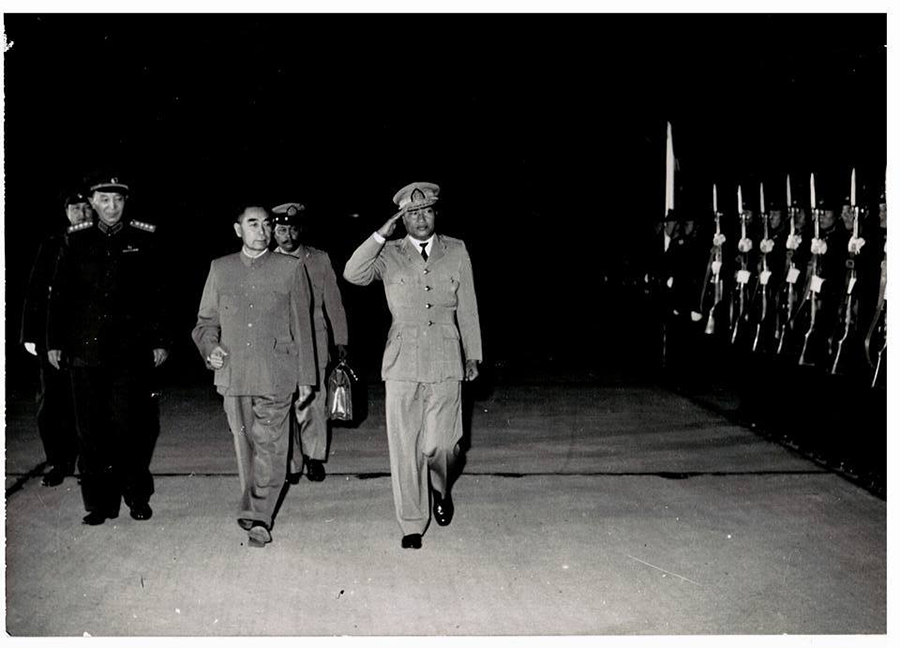 Gen Ne Win and Chinese Foreign Minister Zhou En Lai are welcomed by an honor guard in this undated photo. (Photo: Unknown)1963
Gen Ne Win and Chinese Foreign Minister Zhou En Lai are welcomed by an honor guard in this undated photo. (Photo: Unknown)1963
September 3: The third group of CPB members, led by Thakin Ba Thein Tin, returns from China to Yangonto participate in peace talks.
November: Thakin Ba Thein Tin returns to Beijing from Rangoon. CPB members Khin Maung Gyi, San Thu and Thein Aung return from Moscow to Beijing where they rejoin Thakin Ba Thein Tin and the others. Thakin Ba Thein Tin, Khin Maung Gyi, Thakin Than Myaing, Than Shwe and Tin Yee set up a “leading group of five” in Beijing to prepare for a China-sponsored push into Myanmar . San Thu begin to survey the Sino-Myanmar border areas for possible infiltration routes into northeastern Myanmar . Naw Seng’s Kachins, who have been staying in Guizhou, go to Sichuan for talks with Thakin Ba Thein Tin and other CPB leaders.
1962
February 24: China issues a protest against US intervention in Vietnam, saying it poses a “direct threat” to North Vietnam and jeopardizes “the security of China and the peace in Asia”
August 1: Communist Party of Myanmar [CPB] exiles in China are allowed to issue their first public statement, condemning the new military regime.
1961
January 2-9: Zhou Enlai visits Myanmar . The border agreement is ratified. An economic and technical cooperation agreement is signed on Jan. 9, according to which the Chinese pledge to give Myanmar an interest-free loan of US$30 million to be disbursed during the period Oct. 1, 1961 to Sept. 30.
January 26: A combined force of three divisions (20,000 troops) of regulars from the Chinese Peoples’ Liberation Army (PLA) and 5,000 Myanmar troops attack KMT bases north of Kengtung, Shan State. The campaign is codenamed the “Mekong River Operation”.
April: A joint US-Taiwan communique says, “the 6,000 KMT soldiers remaining in Myanmar ’s Shan State are not in any way connected or concerned with the US government or The Republic of China.
October 10-15: U Nu visits China.
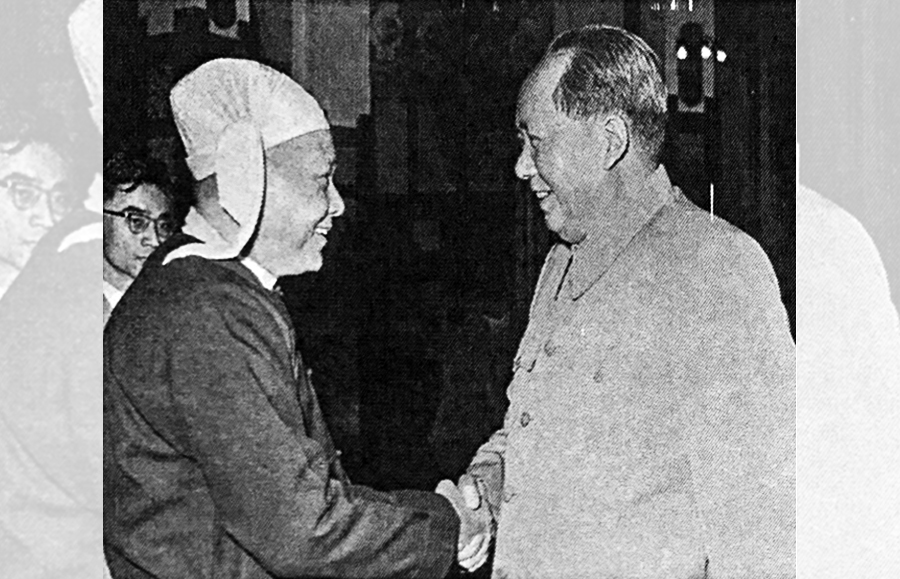
1960
September 4-early October: U Nu visits China and attends China’s National Day celebrations with a delegation of more than 400 persons.
October: A boundary treaty between China and Myanmar is signed in Beijing.
1954
The first trade agreement between the two countries is signed.
June 28-29: Chinese foreign minister Zhou Enlai visits Rangoon.
1953
April: The Democratic Nationalities United Front (DNUF) is formed in the hills near Papun by Karen, Karenni, Pa-O and Mon rebels. Another Chinese army unit enters the Wa hills and clashes with the Myanmar Army.
July 30: Defense Minister Ba Swe says that Myanmar is going to the UN to have Nationalist China declared an aggressor and unseated from the world body. September: Lt-Gen Ne Win leads a high power military delegation to China. They visit munitions factories and army training establishments.
November: U Nu (in his capacity as AFPFL President) visits China and meets with Zhou Enlai. China agrees to withdraw all its forces from disputed border areas in Kachin State. Anti-Fascist People Freedom League [AFPFL].
November: Thirty Chinese soldiers enter the Wa Hills and clash with the same number of troops from the Myanmar army.
December 1-16:U Nu visits China. More talks are held about the border question and the question of nationality of Chinese residents in Myanmar .
1950
January-March: Over 2,000 Kuomintang (KMT) forces from Yunnan cross the border to set up base in Kengtung, eastern Shan state following the Communist victory in China.
1949
October 1: Mao Zedong proclaims the Peoples’ Republic of China in Beijing.
December 17: Myanmar recognizes the Peoples’ Republic of China.
















